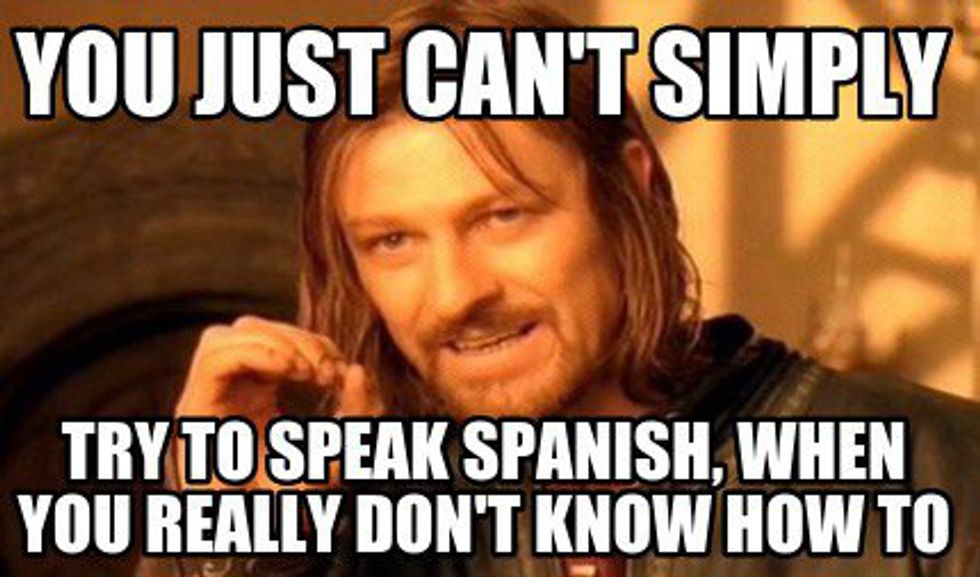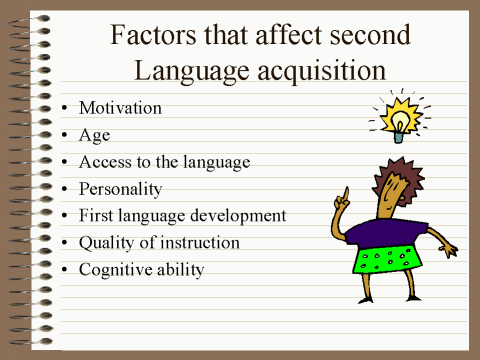Being in college, I knew that to earn my Associates Degree I would be required to take two semesters of a second language. As an adult this is a daunting task to undertake, unless you are linguistically inclined, which I am not. However, with my degree nearly completed I was forced to enroll in a second language course this semester.
I chose Spanish because it is such a widely used language in America. There are around 41 million native Spanish speakers living in the U.S., which means that in nearly any career field being bilingual is a major plus. However, after only two weeks of my Spanish course I have come to terms with the fact that I will most likely never be a fluent Spanish speaker. My Profesora explained to the class that if the second language is not learned before the age of six a person will more than likely never speak the language perfectly or without their native accent. She, being a native Spanish speaker, carries an accent when she speaks English, but reminded us that it doesn’t matter if an accent is present as long as you can communicate effectively. (Thankfully.) Then she informed us that 75% of each class would be taught entirely in Spanish. Then she began to speak in Spanish and I was lost.
I sat there for a good twenty minutes, literally taking in no information. I understood maybe one or two words; and by the end of the day I had realized that I couldn’t even count to ten in Spanish correctly. I wanted to walk out. Just go and never look back. I decided that Spanish just isn’t for me. In fact, I’ll just stay in my little town where there is very little Spanish spoken and forget about any possible pay increases because the word ‘bilingual’ is on my resume or ever traveling beyond the U.S. I wanted to give up, but that would mean giving up my degree, and I wasn’t willing to do that, so I stayed. Even though I still am unable to decipher the majority of what is said and the learning activities only serve to confuse me further.
I’ve taken exactly four classes and I am beginning to understand a little better, but not as well as I want to be. Although every cognate (words that sound alike and mean the same thing in different languages) bolsters my confidence, it is only a momentary glimpse of the light at the end of the tunnel, before I'm sent crashing back to Earth in a ball of flames when I don't understand a solid ten minutes of speech after that one cognate.
Realizing just how difficult it is for me made me wonder why exactly that is. What is it about the human brain that does not allow adults to learn other languages well enough to become fluent speakers? For one thing, language cannot be taught like other subjects in school; memorization and rules will only take you so far. Children are like sponges; they pick up new things far easier than adults. This is because while adults are certainly capable of learning the vocabulary and grammar rules, being able to easily speak the language is a different battle all together.
Language is varied and constantly changing. Just think of the word 'yolo'. Who would have ever though this silly word would be added to the dictionary and become so widely used among American youth? Certainly not me. But do you think someone from another country who is unfamiliar with American slang would learn that word in an English as a Second Language course? Doubtful.
How about contractions, conjunctions, tenses, and sarcasm in American speech? That’s rough to translate adequately.
Katie Nielson, Chief Education Officer at the language learning app, Voxy, may have put it best when she told Business Insider in a 2014 interview:
"In history class, you start chronologically and you use dates in order of how things happened," Nielson says. "That's just not how language-learning works. You can't memorize a bunch of words and rules and expect to speak the language, then what you have is knowledge of 'language as object.' You can describe the language, but you can't use it."
It doesn’t help English speaking students that Spanish translations to English and what the sentence actually means can differ and cause confusion.
For example:
In Spanish, “¿De quién es el libro?” means “Whose book is this?” or “Who does this book belong to?” but when translated to English our brains read, “Who is the book?” Not very helpful.
As it turns out, the age at which you begin learning a particular skill really does matter. Apparently, babies and young children have twice the amount of connections in the brain (synapses) than adults do.
This is due to the recent trauma experienced during birth. (Why synapses don't start firing off after other types of trauma, I have no idea.) As a result, the brain has much more space available in which to obtain knowledge during the first six years than at any other time in life. The things we learn during these years become like second nature. Like the ability to walk, add, subtract, name shapes, hold a fork, and speak; it becomes instinctual and we will know how these things work for the rest of our lives. But by the age of six those replicating connections in the brain have slowed.
This means that, as adults, we are no longer learning instinctually and now are relegated to putting in massive amounts of energy to learn a skill that is very hard to navigate.
On the first day of my Spanish course I knew that I had to do a drastic overhaul on my personal expectations of exactly how much I would learn in two semesters. My expectations are now quite low, but realistic, and I’m okay with that. If I leave this course with the ability to hold a short conversation in Spanish I will see it as a success.
Kudos to anyone who is fully bilingual. You amaze me.










 women in street dancing
Photo by
women in street dancing
Photo by  man and woman standing in front of louver door
Photo by
man and woman standing in front of louver door
Photo by  man in black t-shirt holding coca cola bottle
Photo by
man in black t-shirt holding coca cola bottle
Photo by  red and white coca cola signage
Photo by
red and white coca cola signage
Photo by  man holding luggage photo
Photo by
man holding luggage photo
Photo by  topless boy in blue denim jeans riding red bicycle during daytime
Photo by
topless boy in blue denim jeans riding red bicycle during daytime
Photo by  trust spelled with wooden letter blocks on a table
Photo by
trust spelled with wooden letter blocks on a table
Photo by  Everyone is Welcome signage
Photo by
Everyone is Welcome signage
Photo by  man with cap and background with red and pink wall l
Photo by
man with cap and background with red and pink wall l
Photo by  difficult roads lead to beautiful destinations desk decor
Photo by
difficult roads lead to beautiful destinations desk decor
Photo by  photography of woman pointing her finger near an man
Photo by
photography of woman pointing her finger near an man
Photo by  closeup photography of woman smiling
Photo by
closeup photography of woman smiling
Photo by  a man doing a trick on a skateboard
Photo by
a man doing a trick on a skateboard
Photo by  two men
two men  running man on bridge
Photo by
running man on bridge
Photo by  orange white and black bag
Photo by
orange white and black bag
Photo by  girl sitting on gray rocks
Photo by
girl sitting on gray rocks
Photo by  assorted-color painted wall with painting materials
Photo by
assorted-color painted wall with painting materials
Photo by  three women sitting on brown wooden bench
Photo by
three women sitting on brown wooden bench
Photo by 
 Photo by
Photo by  Photo by
Photo by  Photo by
Photo by  Photo by
Photo by 


 people sitting on chair in front of computer
people sitting on chair in front of computer



 all stars lol GIF by Lifetime
all stars lol GIF by Lifetime two women talking while looking at laptop computerPhoto by
two women talking while looking at laptop computerPhoto by  shallow focus photography of two boys doing wacky facesPhoto by
shallow focus photography of two boys doing wacky facesPhoto by  happy birthday balloons with happy birthday textPhoto by
happy birthday balloons with happy birthday textPhoto by  itty-bitty living space." | The Genie shows Aladdin how… | Flickr
itty-bitty living space." | The Genie shows Aladdin how… | Flickr shallow focus photography of dog and catPhoto by
shallow focus photography of dog and catPhoto by  yellow Volkswagen van on roadPhoto by
yellow Volkswagen van on roadPhoto by  orange i have a crush on you neon light signagePhoto by
orange i have a crush on you neon light signagePhoto by  5 Tattoos Artist That Will Make You Want A Tattoo
5 Tattoos Artist That Will Make You Want A Tattoo woman biting pencil while sitting on chair in front of computer during daytimePhoto by
woman biting pencil while sitting on chair in front of computer during daytimePhoto by  a scrabbled wooden block spelling the word prizePhoto by
a scrabbled wooden block spelling the word prizePhoto by 
 StableDiffusion
StableDiffusion
 StableDiffusion
StableDiffusion
 StableDiffusion
StableDiffusion









